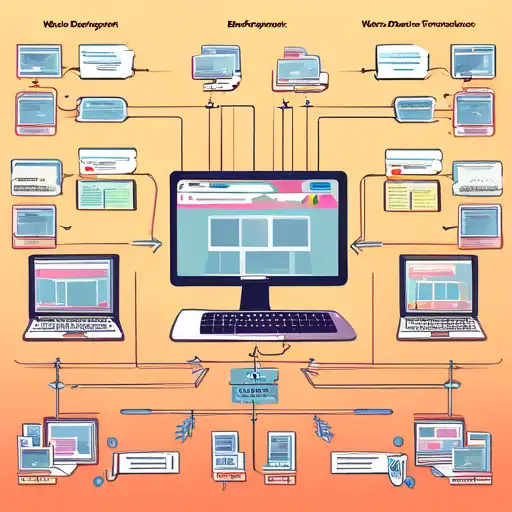Introduction to Web Development Frameworks
In the ever-evolving world of web development, choosing the right framework can be a daunting task. With a plethora of options available, each promising to be the best, how do you decide which one is right for your project? This guide aims to demystify the process, helping you navigate through the maze of web development frameworks to find the perfect match for your needs.
Understanding Web Development Frameworks
Web development frameworks are designed to support the development of web applications by providing a standard way to build and deploy them. They offer a foundation upon which developers can build, saving time and effort by eliminating the need to start from scratch. Frameworks can be broadly categorized into frontend and backend, each serving distinct purposes in the web development process.
Frontend vs. Backend Frameworks
Frontend frameworks, such as React, Angular, and Vue.js, focus on the user interface and user experience. They help in creating responsive, interactive, and visually appealing websites. On the other hand, backend frameworks like Node.js, Django, and Ruby on Rails handle the server-side operations, database interactions, and application logic.
Factors to Consider When Choosing a Framework
Selecting the right framework depends on several factors, including:
- Project Requirements: The nature and scope of your project will largely dictate the choice of framework.
- Learning Curve: Some frameworks are more beginner-friendly than others.
- Community and Support: A strong community and good documentation can be invaluable resources.
- Performance: Consider the performance requirements of your project.
- Scalability: Ensure the framework can handle the growth of your application.
Popular Web Development Frameworks in 2023
Here’s a look at some of the most popular web development frameworks this year:
- React: A JavaScript library for building user interfaces, known for its flexibility and efficiency.
- Angular: A platform for building mobile and desktop web applications, offering a comprehensive solution.
- Vue.js: A progressive framework for building UIs, known for its simplicity and ease of integration.
- Node.js: A JavaScript runtime built on Chrome's V8 engine, ideal for building fast and scalable network applications.
- Django: A high-level Python web framework that encourages rapid development and clean, pragmatic design.
Conclusion
Choosing the right web development framework is crucial for the success of your project. By considering the factors mentioned above and evaluating the popular frameworks available, you can make an informed decision that aligns with your project goals and team expertise. Remember, the best framework is the one that meets your specific needs and helps you achieve your objectives efficiently.
For more insights into web development, check out our guide on the latest web development trends.
